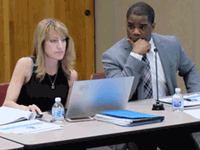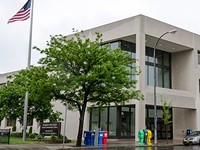[
{
"name": "500x250 Ad",
"insertPoint": "5",
"component": "15667920",
"parentWrapperClass": "",
"requiredCountToDisplay": "1"
}
]
As we leave Afghanistan, will we jump into Syria?
Should we?
An estimated 80,000 people have been killed in the Syrian conflict, and the United Nations estimates that more than 5 million have been uprooted. Officials in Jordan say that 10 percent of that country's population now consists of Syrian refugees, according to a BBC report, and they expect that to reach 25 percent by 2014.
The fighting and the bloodshed need to stop. But Bashar al-Assad has resisted international attempts to negotiate a settlement. He won't leave. And he shows no signs of ending the brutality.
As tragic as the situation is, though, the negatives of military involvement seem to far outweigh the positives.
Senator John McCain and others want military intervention, warning that Assad may use chemical weapons – if he hasn't already. They warn that the chaos in Syria threatens the stability of the entire region. And they warn that the longer we resist helping the rebels, the worse the consequences will be. Humanitarian aid isn't enough, the interventionists say; we need to provide weapons to the rebels, attack Assad's air bases, create a no-fly zone.
But on Al Hunt's Political Capital show on Bloomberg Television, former National Security Adviser Zbigniew Brzezinski had warnings of his own. The rebels are not a cohesive group, and some of them are hostile to the United States. Which rebels would we give lethal weapons to, asked Brzezinski. Those who are seeking a democratic government? The dangerous religious fanatics? The members of Al Qaeda? All of them are part of the uprising. How do we control where those weapons end up?
And if we destroy Assad's air force and the result is "that the more radical elements gain from it and they are stronger militarily," Brzezinski said, "what do we accomplish by it?"
Former Senator Richard Lugar, appearing on the same program, had similar concerns. And, he added, using US air power to attack Syrian bases or enforce a no-fly zone "really does get into warfare," and it "puts Americans at risk."
There would be no point in US military involvement, numerous officials and commentators have said, unless we commit enough to get rid of Assad.
And, Gerald Seib noted in a Wall Street Journal column last week, "When you go big as a superpower, you own the problem forever."
"The lesson of America's incursions in Iraq and Afghanistan," Seib wrote, "is that once the U.S. steps in, other nations tend to step back and leave it to Washington to clean up the mess after the fighting ends." And that, we have learned, takes a very long time and a lot of money.
Syria is a frighteningly complex problem. And in The American Prospect, Steve Erickson makes that complexity starkly clear. We are facing, Erickson writes, "the Frankenstein of foreign-policy crises, made up of the parts of dead blunders." And he ticks off those blunders:
"Vietnam, where we learned that firepower won't overcome the unquantifiables that make for a quagmire; Iraq, where we learned that intelligence may be faulty or manipulated; Libya, where we learned both the combat possibilities and limitations of no-fly zones; Afghanistan, where a quarter-century ago we armed freedom-fighters who became accomplices in the murder of 3,000 citizens on American soil; Kosovo and Rwanda, where we ignored mass slaughter at the cost of our collective conscience; and Somalia, where we answered the call of conscience to disastrous end."
"Syria," Erickson warns, "surpasses them all."
It's no surprise to see senators like John McCain urging military action. But we are facing new kinds of conflicts, with new kinds of enemies. We cannot solve them by ourselves, and as awful as the humanitarian crises are, we cannot be the police agent for the world.
This is a time for caution and reason. And unfortunately, the intense heat in Washington may overwhelm them both.
With Syria, one journalist writes, we are facing 'the Frankenstein of foreign-policy crises, made up of the parts of dead blunders.'
Speaking of...
-

McCain, Trump, and the state of this nation
Aug 27, 2018 -

Trump's transgender ban: Another time to resist
Aug 2, 2017 -

WALL\THERAPY 2017: Todd Stahl takes a focus on Syria
Jul 25, 2017 - More »
Latest in Urban Journal
More by Mary Anna Towler
-

Police reform: advocates on what should come next
Oct 22, 2019 -

Court clears the way for Police Accountability referendum
Oct 17, 2019 -

Dade outlines initial actions on district deficit
Oct 9, 2019 - More »






